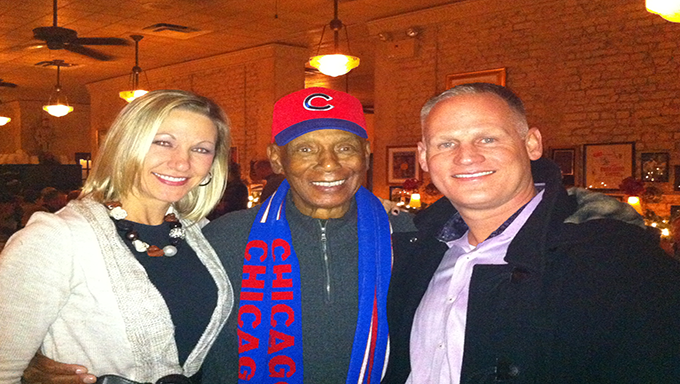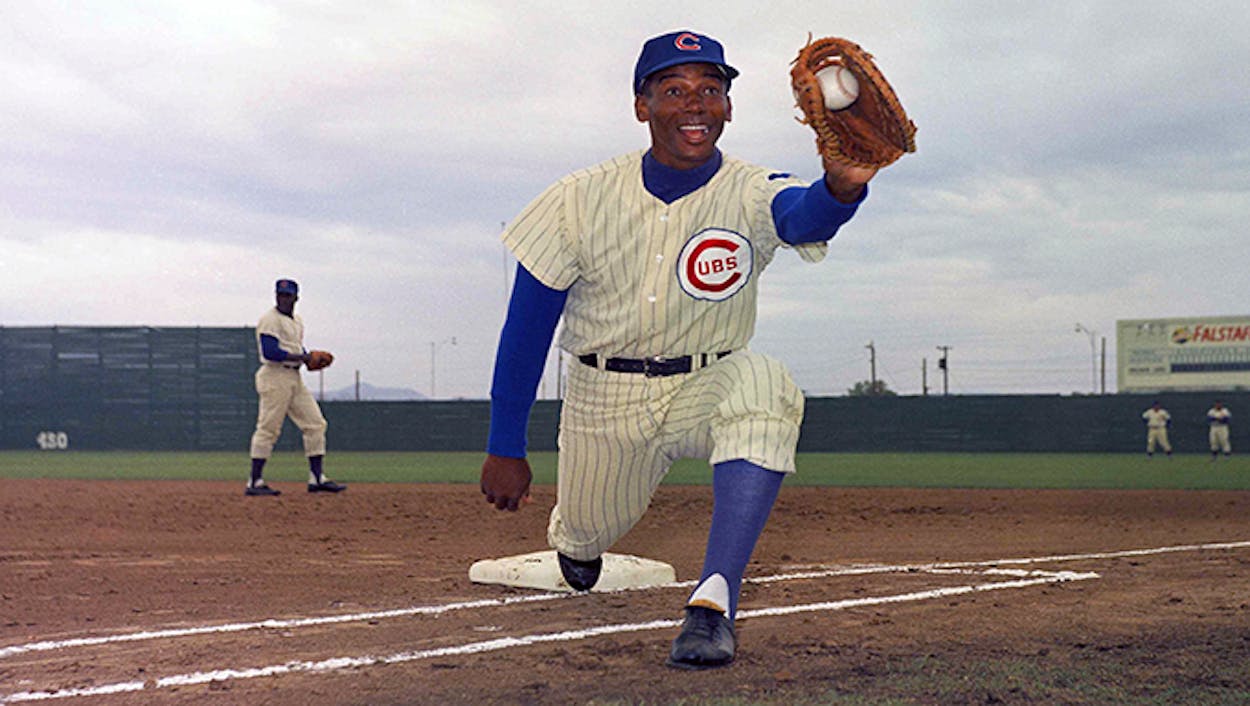To most baseball fans, Ernie Banks was “Mr. Sunshine,” a power-hitting teddy bear of a man with a thousand-watt smile, a genial man who lived for baseball and only baseball.
“Mr Cub,” as the Dallas native was also known, has gone down in diamond lore as the man who always said, “It’s a beautiful day for a ballgame … Let’s play two!”, a black man who transcended his upbringing in Jim Crow Dallas to become one of the most beloved figures in Windy City sports history, perhaps the most revered until the ascension of Michael Jordan.
That was not the man Shelby and Hans Hansen met in Harry Caray’s Italian Steakhouse near Lake Michigan in 2011.
Hansen, a Houston native, Texas Tech professor of business, Embrey Human Rights Fellow at SMU, and an advocate for justice in capital punishment cases, had just finished a conference in Chicago and was enjoying some down time.
Along with his wife, Shelby Neill Hansen, they had just tried to attend to the festivities accompanying the lighting of the Christmas illuminations along Michigan Avenue’s “Magnificent Mile,” but could get no closer than a block or so to the parade, where Banks was serving as grand marshal. That’s when they adjourned to Harry Caray’s steakhouse.
Hansen was a swimmer in high school and no baseball fan, so it was not out of adulation for the oft-sozzled, “Take Me Out to the Ball Game”-bellowing broadcaster that they chose to dine there. “It was just a proximity thing,” he says. “It was just the closest 5-star Urbanspoon steakhouse to our hotel.”
And there, in the middle of the dining room, decked out in a Cubs hat and scarf, fresh off the float as grand marshal at the Magnificent Mile parade, Ernie Banks was eating alone. Hans barely knew who Ernie Banks was, though Shelby, as the granddaughter of a diehard Cubs fan from West Texas, sure did. She was thrilled to see the slugger shortstop in the restaurant, where he was eating an appetizer, graciously signing autographs and chatting with a nonstop stream of well-wishers.
While waiting for their table the Hansens walked over. Almost by way of greeting, Banks told Hans that Shelby was too pretty to be with him, the first of several times he would say so. Hans laughed it off and Banks asked them where they were from. Hans said Texas, and added that he was a professor at Texas Tech. “Well, I was born in Texas too,” Banks said. “Y’all sit down!”
The Hansens did as Mr. Cub asked them and canceled their reservation the next time the waiter came by. There followed a three-hour dinner, wherein, as Hans remembers it, the three of them talked about everything on earth except baseball. “He loved it,” Hans remembered. “And we really loved it. We just held court at a table in the middle of a bustling restaurant and just talked until the place closed.”

They talked of Banks’s upbringing in segregated Dallas, where he grew up at 1723 Fairmount Avenue, the third of twelve children in what is now the Big D’s downtown Arts District. Banks had been a bellhop at the Adolphus Hotel. He’d starred on Booker T. Washington High School’s football, track and basketball teams, but not the baseball team, as Washington had none. (He played fast-pitch softball for a church team in the summer, vaulting from there to the Kansas City Monarchs of the Negro Leagues, and then straight to the Majors.) Banks also picked cotton outside Frisco to help his huge family make ends meet.
Though he spoke sunnily of his Dallas upbringing at times—“Our North Dallas was a great place to grow up,” he told the Dallas Morning News in 2013—he told the Hansens he was once arrested for loitering as a young man. “He said he hadn’t been doing anything,” Hans says. “I don’t think he was in jail very long for that, but he still remembered it.”
During their dinner together, the procession of well-wishers and autograph-seekers slowed, but did not cease. “I kind of wonder if that was why he asked us to sit with him,” Hansen says now. (Alone, Banks was an easier target.) “At one point, a father and his about six-year-old son came over, and the dad said, ‘Mr. Banks, my boy has a question for you.’ The dad kinda nudged his kid, who smiled like Opie Griffith and said, ‘Mr. Banks, how do you hit the curveball?’ He just said, ‘Well, let me see your stance.’ The boy took his stance, and he said, ‘Well there you go! You got it son!'”
Meanwhile, Banks was keenly interested in Hansen’s work as an anti-death penalty advocate. Banks told him that he had frequently visited prisons in the past and was eager to find a solution to the high rate of incarceration among African-American youth. Hansen told him that the top two factors that determined those condemned to death were first, the race of the victim (whites over blacks), and second, the race of the perpetrator (blacks over whites.)
Several times over the course of the evening, Banks pulled out a leather-bound phone book and gave Hansen numbers of people he should call to help him in his cause, and at another time, stopped the conversation to try to summon a dignitary right there and then. “You know who should be here right now?” he asked the Hansens. “Dr. Cornel West.” Banks whipped out his cellphone—it was after 11 p.m.—and punched in West’s numbers. “He left a message,” Hansen remembers. “He told him, ‘If you get this, come to Harry Caray’s.’ I don’t know if Dr. West was actually in town or not that night, but he said he was.”
Hansen said Banks got a little foggy at times, repeating anecdotes and that gibe about how Shelby was too pretty to be with him. “But it wasn’t like he lost it or anything. He was about eighty and it was late at night and he had just been the grand marshal at a parade.” Even so, Hansen was astonished at the focus of Banks’s mind. “He was so solutions-oriented,” he says. “Everything was ‘Here is what we need to do.’ He was stern and serious the whole time.”
Some time after midnight a waiter handed the Hansens a check. Banks appeared to eat free. Busboys cleared the tables and started stacking the chairs. The trio headed for the door and said their goodbyes. The Hansens headed one way toward their hotel, and Mr. Cub walked off into the night, alone.

(Photos: AP Images; Courtesy Hans Hansen)







